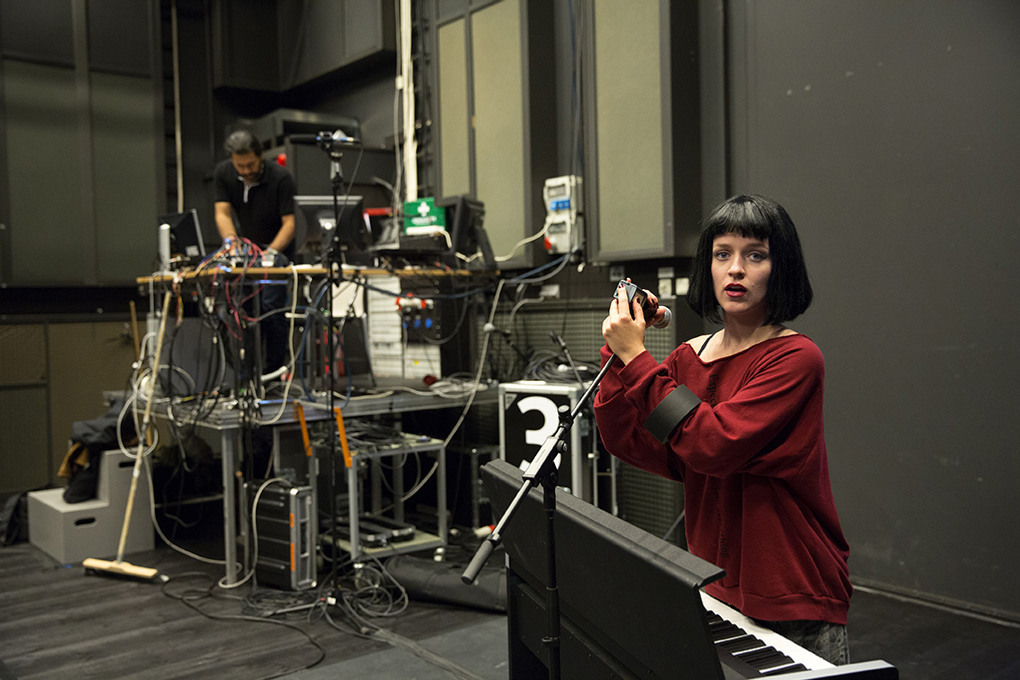20 years of Departure: “Rewriting the map of what actors can do”
The basis of the Departure festival is simple, but also a huge undertaking. Each individual student is tasked with putting together a show from scratch: writing, directing, producing, but also stage design, sound, lighting, costumes, all the elements that go into a theatre production. They are allowed to bring in others to help, but the artistic vision must come from within themselves. And they are the ones who will ultimately stand alone on stage and face the audience.
“You almost never see a theatre performance that comes from a single person, both text and sound and image,” says Per Sörberg, Assistant Lecturer at SKH who has been involved with Departure since it started. “It’s really fascinating to see it as an audience. The performances differ so much, they create very different universes.”
There is an incredible space for personal visions. But at the same time, almost paradoxically, Departure also means that the actors get to look outside themselves. To see how an entire collective works on a theatre performance.
“A student actor is often so incredibly, introvertedly focused on their own technique, their own body, their own voice, their own interpretation,” says Per. “With Departure, you're forced to leave yourself behind and take on an outside perspective – what am I saying? What do I want the audience to see? You have to make your own artistic choices in a way that an actor almost never gets to do.”
In the punk ethos
When Departure was founded, this kind of approach was very unusual. Forming your own companies and creating your own productions has been an element of mime acting education, and there is of course a long history of independent theatre groups creating their own material, but acting education still had a clear focus on ensemble acting and classical texts.
The initiative for Departure came from Ulrika Malmgren, a teacher at the university and an actor with a background in the punk movement, who had already been involved in forming the theatre group Darling Desperados during her own studies.
“I've always based my theatre work on what I want to say, even in my music,” says Malmgren. “I've always wanted to be the one who is the host and the inviter, the one who conveys something important.”
She booked a meeting with the Vice-Chancellor of what was then National Academy of Mime and Acting, Olle Jansson, and put forward the idea of giving students the chance to do something where they could be more experimental, in the form of their own project, with a small budget and their own artistic choices. The Vice-Chancellor liked the idea and let her try it out with a student, Lo Kauppi, who got to write and perform the monologue Bergsprängardottern som exploderade, a huge success that was performed to full houses even outside the walls of the school.
“Then I was given the task of starting the same kind of work with all the students, over 20 of them, both from the mime acting programme and the acting programme,” Ulrika says. “And there was simply no such thing at the time. Established actors such as Gösta Ekman would sometimes be allowed to stage monologues written by famous playwrights, but it was considered controversial for young people to be allowed their own stories. Critics claimed that ‘they don’t have anything to say, they haven’t had time to experience life yet’.”
Breakthrough successes
The critics were perhaps wrong that time around. From the very beginning, it was clear that there was a need for this type of performance, and even in the first batch, some shows went on to be staged in professional theatres. This has continued over the years, with over a dozen student productions ending up on major stages such as the Stockholm City Theatre, the Royal Dramatic Theatre and Riksteatern.
For some, it has become an important route into professional life as an actor. Having the opportunity to express yourself also gives you the chance to say who you are and what you stand for. Staging your Departure performance externally has become a springboard to the outside world, and some people applying for the programmes today already know from the outset what they want their Departure performance to be about.
Pablo Leiva Wenger, who is now an established actor on big stages, had the opportunity to put on his Departure performance 127 at the Stockholm City Theatre immediately after graduating.
“My Departure show was written by my brother Alejandro Leiva Wenger,” says Pablo. “I was better known as an active rapper at the time. As early as the first year, my brother and I started discussing our upcoming monologue show, which shows how Departure stimulates creativity and preparation long before the actual production takes shape. The many conversations and ideas we exchanged became a foundation for building something genuine and meaningful.”
The importance of voices
Many students have appreciated Departure precisely because they have been able to steer the work in the direction they wanted. Andreas T Olsson, whose production of Sufflören was picked up by the Royal Dramatic Theatre after premiering at Departure, says that working on it allowed him to influence the content of his own training.
“I wanted more classical texts in the programme,” says Andreas. “I wanted to learn iambic pentameter and alexandrines. So I wrote my performance based on that, and that way I got to work with classical texts while studying. I had a clear goal of what I wanted. You have to find your own way of being, your own motivation.”
Although Departure has led many to finding employment, this kind of personal motivation is much more central, says Ulrika Malmgren.
“I hope that the students do not primarily think of this as a ticket into the industry, but as an opportunity to try something they will not get to do when they enter the labour market,” says Ulrika. “They will end up in a context with large ensembles, a large organisation, in other people’s visions. Here they have the chance to tell a story that is close to their hearts.”
“As an actor, having an arena where you can create, experiment and develop is invaluable,” says Pablo Leiva Wenger. “Not only for personal development, but also to be able to contribute something unique to the performing arts.”
Today, the project has spread to other theatre academies, to folk high schools and to secondary schools, and even abroad. And Departure continues full steam ahead into the future, with the next round premiering this Saturday, 5 October.
“It has obviously meant something,” says Ulrika Malmgren, who handed over the reins of the project to others in 2014. “Twenty years have passed, and it has rewritten the map on what acting is and what an actor can do in their profession. When students are given the opportunity to dream freely from their particular perspectives and needs, it leads to skilled and courageous actors.”
SKH turns ten

SKH is celebrating ten years as a university college in 2024, and we'll be filling the year with retrospection, foresight, articles and events that connect to the decennial in various ways.
Departure 2024
When: 5-12 October
Where: SKH, Valhallavägen 189 and 193. Metro Karlaplan.
Price: Free entrance!
.jpg)
Departure often consists of self-penned texts, but existing material may also be used. In Linus Troedsson's staging of Brückner's Woyzeck in 2020, the actor reworked the play into a monologue. The production was later staged at the City Arts Centre. Photo: Anna Ukkonen/SKH
.jpg)
The individual actor works on all parts of the production during Departure. Here, sound and music are prepared in mime acting student Hanna Ollikainen's performance Another Me(a) from 2016. Photo: Jonas Jörneberg